ECONOMIC TAILSPIN OP-ED
Bad policy choices, poor governance, weak leadership are wrecking SA’s economy
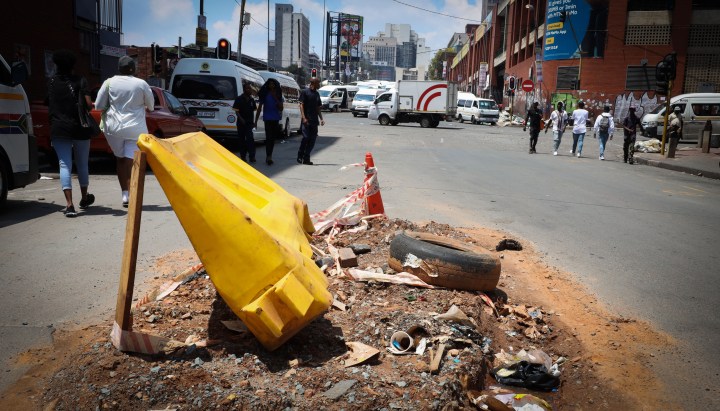
Poor policies and bad governance are everywhere: from electricity and logistics to local government and deteriorating confidence in mining policies, from catastrophic levels of corruption to unsustainable levels of public spending and debt and failure to deal with criminality.
The International Monetary Fund warned last week that South Africa faces 0% economic growth in 2023, and that things are going to get worse without much-needed reforms. This is no surprise.
The dire performance of the South African economy over the past 15 years is overwhelmingly the result of bad policy choices, a catastrophic decline in governance, and a devastating lack of leadership.
In many areas, we continue to make the same mistakes over and over again, with little sign that political leadership is able to rethink policy and improve governance.
While every instance of bad policy or bad governance damages the economy in a particular way, an important channel through which they collectively impact macroeconomic outcomes is the devastating toll they take on confidence in the future.
Degradation of capacity and ability
This dynamic plays a huge role in explaining disappointing economic growth over the past 15 years. The fundamental reason for the decline in growth is that bad policy and governance have meant that confidence in the future has collapsed, resulting in little investment in infrastructure, combined with losses to our human capital stock through emigration of skilled professionals.
Thus, our growth is slow not because aggregate demand has been too weak, but because our capacity to produce goods and services has degraded. We are becoming a poorer society, one that is less and less able to create value and grow.
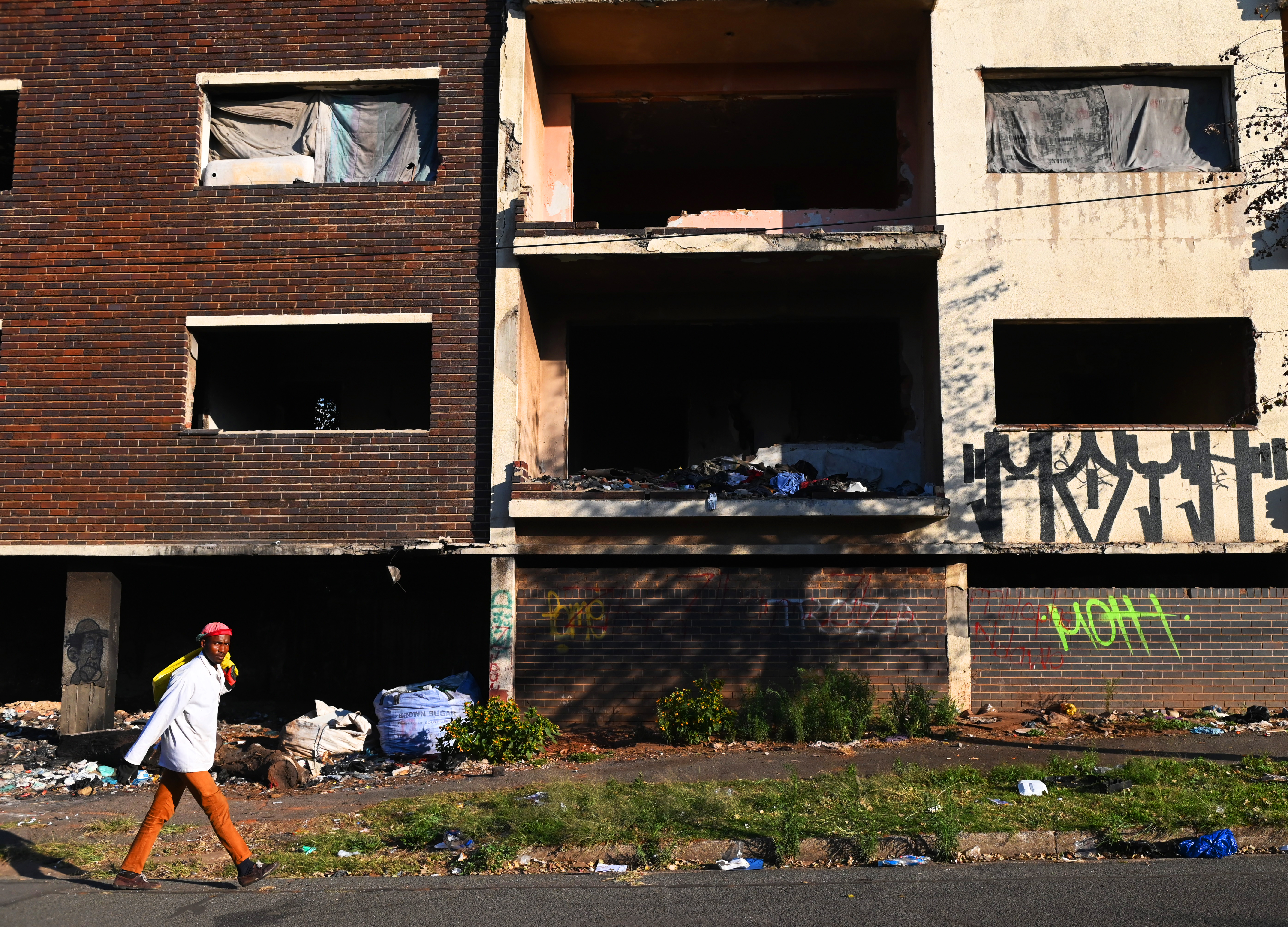
Residents are seen collecting water from the water tankers due to water outages in Yeoville on Friday, 12 May, 2023. The area has many other service delivery issues including potholes, crime and dilapidated infrastructure. (Photo: Leon Sadiki)
South Africa’s macroeconomic policies and their effects vindicate this: the stimulus provided by deficit spending has produced little or no growth and has, instead, resulted in a rapid build-up of debt, rising macroeconomic risk, and higher interest rates.
One of the most important examples of where poor policy choices and bad governance have become a drag on growth is fiscal policy. Bad policy choices (unaffordable wage agreements with public servants) and bad governance (especially the failure of the president and Cabinet to respect budget constraints and their wilful blindness over many years to the consequences of unsustainable fiscal policies) have had catastrophic effects on sovereign debt levels, debt service costs and interest rates.
The impact on the budget (where more and more spending is absorbed in compensation of public servants and debt repayments) and on investment (where high-interest rates have businesses and households reluctant to invest), has been enormous with dire long-term consequences.
SOE black holes
The obvious example of how these factors influence growth is Eskom — once rated as world-class. Now, it can barely keep the lights on.
The key to this malaise is a policy choice that, until recently, ensured Eskom enjoyed a monopoly position in electricity generation, even as global experience made it abundantly clear that electricity generation is much more efficient if multiple providers compete with each other.
Maintaining Eskom’s monopoly has had a critical weakness: the collapse of Eskom governance through corruption and incompetence. Think of the R400-billion Eskom ploughed into two power stations that don’t produce the power they are supposed to — with catastrophic implications for the whole country. Almost no new generating capacity has been added to the grid even as the performance of existing power plants has deteriorated. This, as prices have soared.
Transnet is another state-owned company with a statutory monopoly whose performance has deteriorated abominably. Transnet’s provision of logistics services is increasingly seen as a material risk to the commercial viability of all kinds of economic activity.
There are mounting concerns about the quality of South Africa’s roads, including in the economic heartland of Gauteng. The same is true of water infrastructure, sanitation and wastewater services, and commuter rail services provided by Prasa.
Add to this the deteriorating state of hospitals, police stations, other offices (Parliament burnt down in 2021 and repairs have yet to even begin!), and the cumulative impact of bad maintenance and procurement is evident.
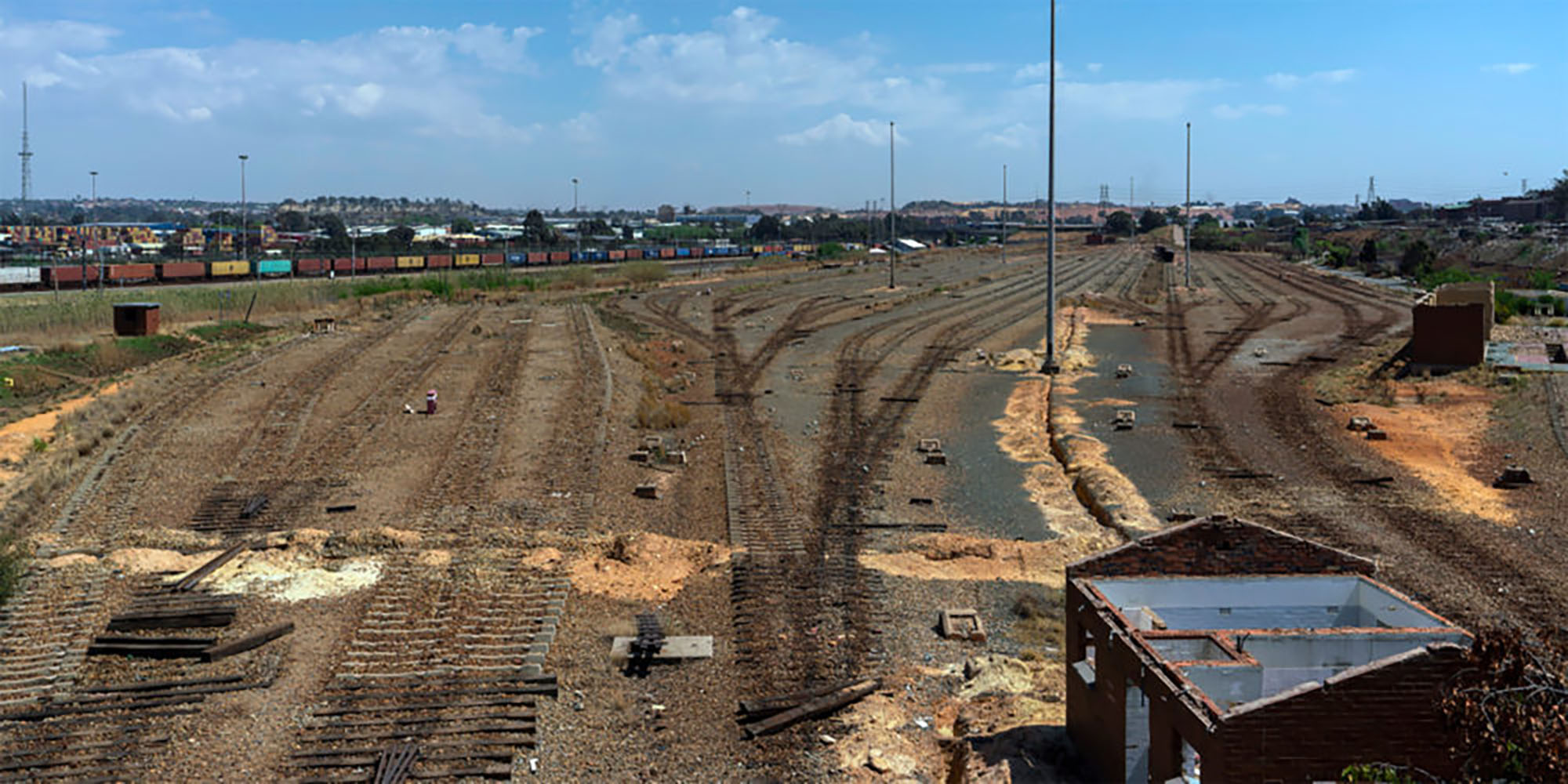
An image taken from the top of the pedestrian bridge at the Old Benrose Station, Johannesburg, showing the remains of what was once several railway lines. (Photo: Shiraaz Mohamed)
Not what you know, who you know
Underlying all of these trends is the ANC’s cadre deployment strategy. The appointment of wholly unsuitable people into key organisations mandated to provide and maintain infrastructure was always going to lead to institutional decline, if not collapse.
These incapacity problems are compounded by saddling these deployees with a profound and unconstitutional conflict of interest: it is simply impossible to faithfully serve the interests of the ANC and fulfil one’s fiduciary duties to the public organisations they head.
Equally important has been the country’s signal failure to address the cancer of corruption, which metastasised during Jacob Zuma’s presidency, and which remains a profound threat to the future. Corruption distorts economic activity in the short term, raises the costs of doing business, and, by undermining faith in a better future, reduces investment levels.
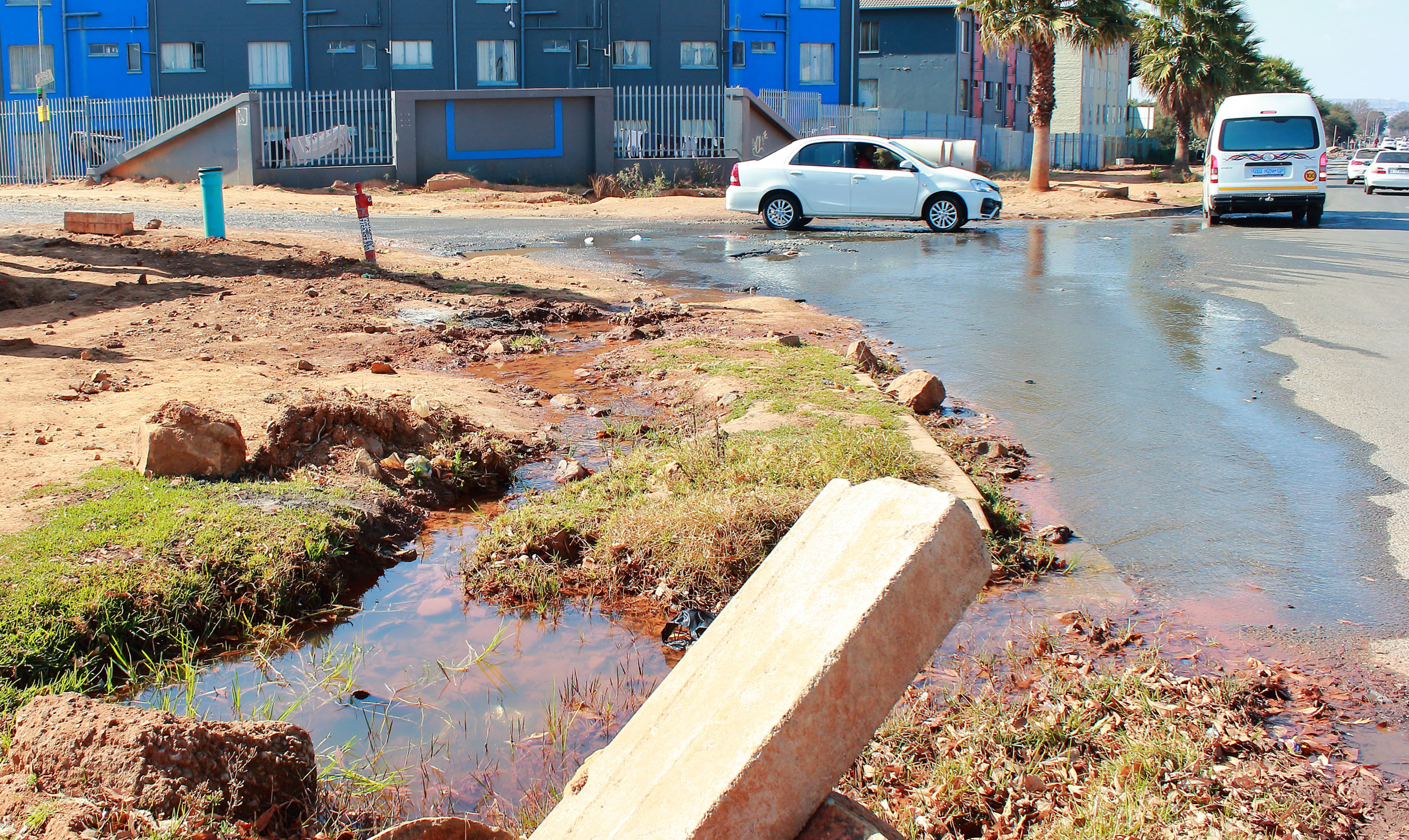
Motorists drive past leaking water along Mphuti Street on 8 July, 2021 in Soweto, South Africa. It is reported that traffic along the road has been affected for months by the leaking water and the road has potholes and garbage trapped on the side. (Photo: Gallo Images/Fani Mahuntsi)
The same can be said of South Africa’s high levels of crime, and, in particular, of the emergence of new kinds of criminality such as the construction and procurement mafias, whose actions impact very directly on the investability of the economy. Add to that the very clear sense that the events of July 2021 might be repeated at some point, and it’s increasingly difficult to make a compelling case for the economy’s long-term prospects.
Read more in Daily Maverick: Business and communities still struggle to recover from July 2021 while alerts issued to avoid another insurrection
Poor policies and bad governance are everywhere: from electricity and logistics to local government and deteriorating confidence in mining policies, from catastrophic levels of corruption to unsustainable levels of public spending and debt and failure to deal with criminality.
The result? The costs of doing business are higher than they should be, and the potential rewards from investment lower and more uncertain, leading to declining levels of investment and less growth.
The impact of poor governance and policy on confidence in the future is compounded by a devastating lack of leadership.
The president is responsible for key policy choices and the way in which they are implemented. And yet he consistently fails to govern in the interests of the country rather than the elite of his own party. At no time has he provided an accurate, comprehensive and compelling diagnosis of South Africa’s ills — an essential foundation on which to start to move forward. Instead, he tries to manage crises by offering “solutions” that seldom address those crises’ root causes, none of which might plausibly set the country on a new path.
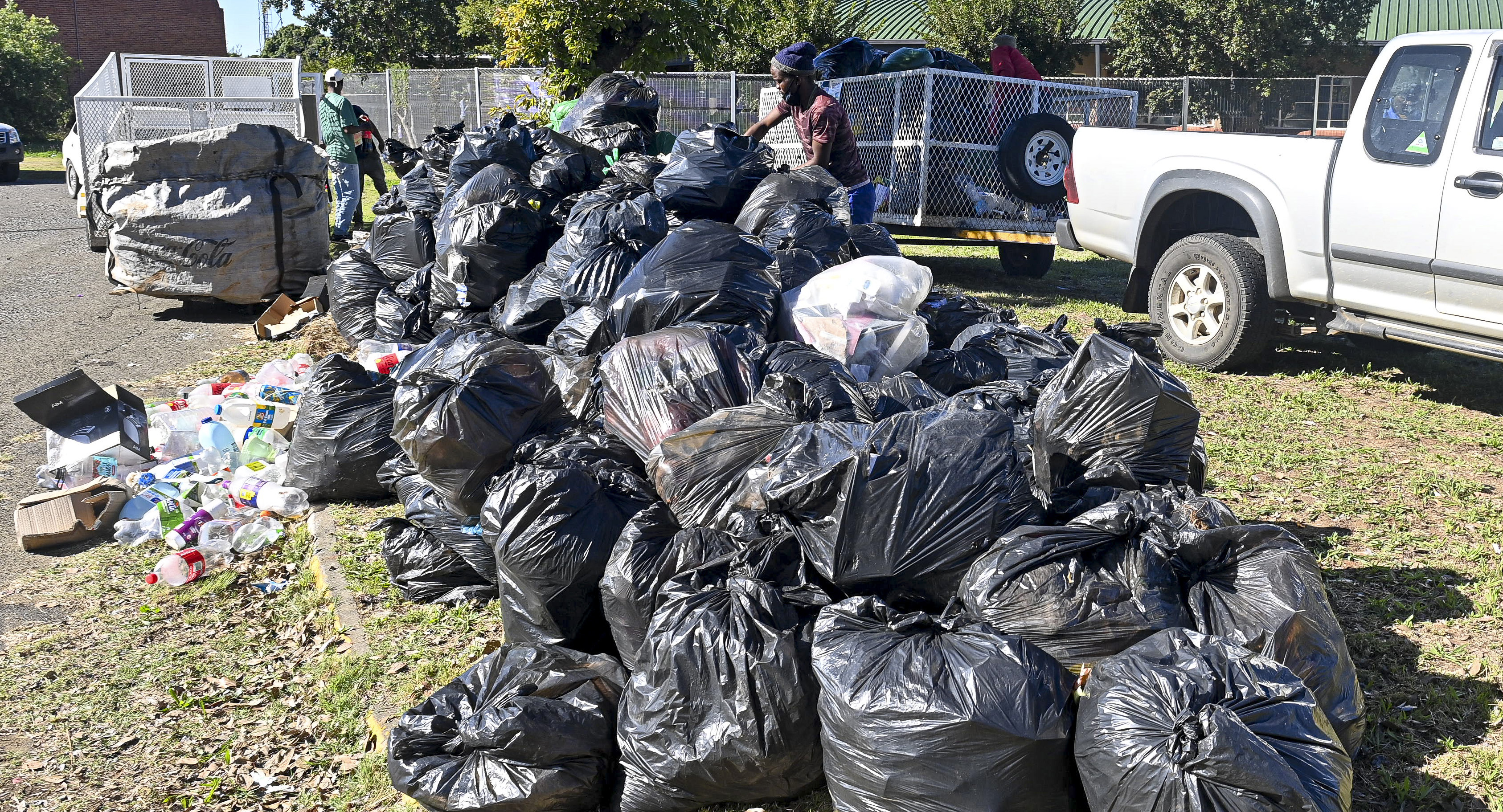
Bags of rubbish collected on 4 April, 2023 in Bloemfontein, South Africa. It is reported that the members of the Bloemfontein Neighbourhood Association Group, the metro garbage disposal chief and non-striking staff, residents, and politicians all came together to clean the streets as the strikes over wages continues in the metro. (Photo: Gallo Images/Volksblad/Mlungisi Louw)
Nor, despite the crumbling state around him, has he moved away from a state-driven approach to growth. Indeed, he has not really prioritised growth at all.
Despite rhetoric to the contrary, South Africa does not have a growth strategy.
It has leaders who say they want growth and policy documents that describe how important growth is. However, at no stage has the country’s political leadership made a decisive choice to prioritise growth or put in place the components of sound policy and good governance essential to an effective growth strategy.
Instead, we have a state that is increasingly a brake on growth and unable to deliver on its most basic functions, presiding over deteriorating infrastructure and rapidly rising levels of indebtedness, and in which the corrupt thrive at the expense of good managers, and where the lives of whistle-blowers are increasingly at risk.
This is the polar opposite of a growth strategy: it is a trajectory along which the productive capacities of the economy are diminishing, not expanding and in which almost all signals to investors and entrepreneurs flash red rather than green. DM
Ann Bernstein is head of the Centre for Development and Enterprise. This article is based on a new CDE report, “SA’s anti-growth strategy: How poor policy and bad governance are wrecking growth”.



















A well thought and succinct passage through the high-level catastrophe that the ANC has visited upon our once hopeful and willing nation. SA in 1994 had the best opportunity of virtually any nation (but certainly in Africa) to build a successful and equitable society. Those middle classes who remained ( and there were many) were in the main euphoric and ready to play their part as useful tax-paying citizens, thanks to Nelson Mandela there was the notion of a Rainbow nation and an African willingness to reconcile. The country’s industrial, mining and financial base was solid with the utilities and infrastructure to support growth. Properly harnessed with sound economic and social policies the country would have provided a safe and stable platform for sustainable growth and employment and upliftment. Instead blind adherence to outdated and discredited political ideology and poor/non-existent leadership has weakened the economy, destroyed confidence and left the country in a state of despair and disarray. Criminality stalks the suburbs and the business base to the extent that people and companies are not going to invest money or their skills. Yet the ANC stumbles blindly on foisting yet more unworkable plans on a broken tax-base. Thinking people have long predicted and warned of this situation but throughout the past quarter century the ANC have refused to listen or change. None so blind who will not look-none so deaf who will not listen.